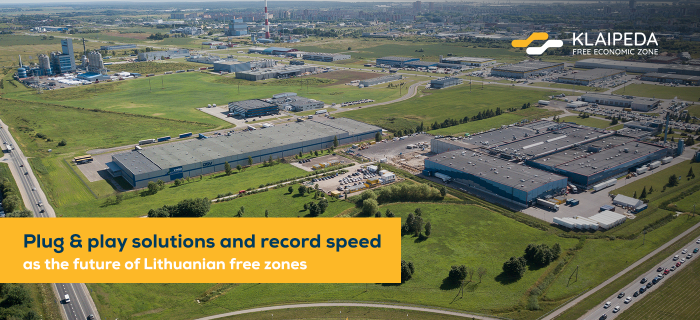News & Events
Watch our activity in one place
Invest Lithuania: FEZ future belongs to plug & play solutions and record-breaking launch speed

“We want the main advantage of Lithuania’s Free Economic Zones in the future to be plug and play solutions with ready plots of land and the infrastructure you need, from water supply to complete electricity coverage. An opportunity to establish a company and start production in a record-breaking time would be an unassailable advantage when it comes to competing for investment from abroad,” Mantas Katinas, the general director of “Invest Lithuania”, comments to Verslo Žinios, the main Lithuanian business daily.
In 2017, Lithuanian free economic zones were beneficial to the country. Tax write-offs, infrastructure investments, and incentives paid out to companies reached 132 million EUR, while companies and employees paid taxes worth 356 million EUR.
Invest Lithuania, the Lithuanian investment acquisition agency, calculates that the positive impact to public finance by the Free Economic Zones in 2002 – 2043 will be 6.6 times greater than investment from the public sector and tax relief funds. These figures are provided in the Invest Lithuania review, titled “Lithuanian Free Economic Zones in 2019” (available in Lithuanian only).
“This detailed review will allow different parties to communicate and evaluate FEZ activities by making sure that everyone is using the same materials,” says Rokas Krivonis, the President of the Lithuanian Association of Free Economic Zones.
In 2017, there were 52 companies operating in Lithuanian FEZs. These companies employed 5,000 people. Their income reached 1.24 billion EUR, exports accounted for 75% or 936 million EUR, which is 6% of the total value of all Lithuania-based exported goods. FEZ companies imported less than they exported (676 million EUR), so their activity positively impacted the balance of trade in Lithuania.
Throughout 2017, FEZ companies created 172 million EUR of added value, which is 2.4% of the total sum recorded by the manufacturing industry in Lithuania. In 2017, a single FEZ employee generated 82,000 EUR of income to direct FEZ company suppliers from Lithuania. Let’s compare: one employee in the entirety of Lithuania during the same time period only generated 52,000 EUR in income.
“So, we can say that five jobs in FEZ companies allowed Lithuanian suppliers to create eight jobs in their own firms,” calculates Invest Lithuania.
The analysis has also shown that even though the Free Economic Zones were established in the territory of Lithuania, the average wage in FEZ companies was 9% higher than the one recorded in the whole Lithuanian manufacturing industry. The productivity of employees in FEZ companies was around 36,000 EUR, which is a bit higher than the national average in the Lithuanian manufacturing industry.
Based on calculations, FEZ companies have created 1.1 million EUR of added value starting from 2002 and made 589 million EUR in profits from 2005.
Eimantas Kiudulas, the CEO of the Klaipeda FEZ, comments that the tax relief measures offered in Lithuania are mere “hygiene”, something everyone does as a matter of routine. These measures are offered in all neighboring countries and are considered to be a way to equalize competitive advantages. With that said, Poland seems to be heading in a more interesting direction by trying to separate the tax incentives attached to the FEZ status from specific geographic locations, i.e., any territory in the country could be considered to be a FEZ.
“However, with the wages in the region rising, foreign investors looking for manufacturing space are looking at more factors like the size of the workforce, it’s qualification level, bureaucratic procedures, launch speed, infrastructure, ecosystem, opportunities to not only manufacture but also create and develop research projects,” says E. Kiudulas.
For a while now, the Klaipeda FEZ has been offering additional services and opportunities to recognize the reality of the modern investment market. For example, the Klaipeda FEZ invested its own money and built FlexStart, a 7,500 square meter manufacturing plant in 2018. The space in FlexStart can be quickly adapted to the individual needs of the customer in 1-3 months. This solution received wide acclaim, earning the first-ever Quick Launch Award from fDi Intelligence, which is a part of the Financial Times Group. Most of the space in the first FlexStart building has already been rented out and we are seriously considering starting a second FlexStart plant. Aside from that, the FlexStart project opened up some even more interesting business opportunities, like renting manufacturing space temporarily, while the investor is still in the process of building a much bigger factory of its own.
“This situation clearly showed us that speed is very important to modern investors. We are also proud to create significantly more added value than we would have if we only rented land. We are dedicated to looking for more opportunities to develop more value-oriented projects and initiatives for our investors,” says E. Kiudulas.
